Teacup Breeds – Are They Real
October 17, 2009
here are so many breeders selling so called teacup dogs, but are they really a teacup size? Teacup dogs are dogs that are small enough to fit in a teacup, giving rise to the name. They are being bred smaller and smaller, because it is believed that is what people want. Puppies whose size has been intentionally reduced to fit into a teacup are prone to all sorts of health complications. Should we continue to reduce their sizes or just enjoy the miniature sizes that are available now.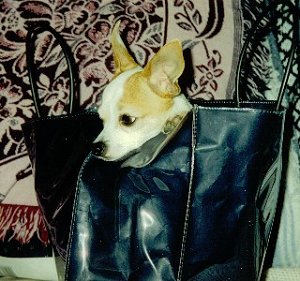
Teacup puppies for sale
Often the term “teacup dog” is used as a marketing ploy to drive up the price of a puppy, as some people find the extremely small size desirable. The term teacup dog covers many varieties of miniature or toy breeds of dog.
Chihuahuas and Maltese are examples of toy dog breeds. There is no such thing as a “Toy Chihuahua“, or “toy Maltese”. Chihuahuas and Maltese are already toy breeds so the term Toy Maltese is a misnomer and leads the buyer to believe they are getting something even smaller. The AKC standard for a toy breed is 6 lbs and under which, at the time of writing, would cover so-called teacup breeds. To say a dog is a teacup Chihuahua possibly suggests that its growth was stunted at birth and therefore have defects that may not be obvious when purchased.
Making the most of normal small breed dogs will give you more satisfaction than a dog that is not correctly bred.
Introduction of size breeding
Some dog breeds such as the Shi Tzu (Tibetan Temple Dog, Tibetan Lion Dog) have always been small while other breeds have been reduced from their standard size to miniature and toy.
Before and during the early part of the 19th century all dogs were working dogs to a certain degree. Breeding of dogs specifically for appearance was introduced in the mid 19th Century. Take for example the classic Poodle.
Poodles were used as a water fowling dog for many years until their size was reduced to allow them to become a housedog and reduced further to become a lap dog. Many people like the smaller breeds because they have a more genteel appearance. Breeds that are naturally small are fun but also very protective despite their size.
For many small breed owners, dressing their “babies” in cute clothes has become the latest trend. There is nothing wrong with that as long as the puppy is comfortable. Wearing a coat indoors may not be necessary and may make the puppy unnecessarily hot but the use of a jacket when outside may be beneficial in keeping a chill at bay, especially when they have been short groomed.
Maltese, Pomeranians, Yorkies, Miniature Pinscher, and Papillion’s are just some of the dogs that are ideal to wear clothes. There are all sorts of small dog clothing available and includes dog robes, dog raincoats, dog dresses and dog coats. There are even booties available to protect their tiny feet.
Min Pin: Small Dog, Big Attitude
October 16, 2009
The Miniature Pinscher might be small, but these compact, resolute, muscular dogs should not be ignored. In spite of their unintimidating size, Min Pins provide excellent protection for their family as watchdogs. These wonderful dogs can be summed up in the interesting contrast of being fearless yet loving and gentle.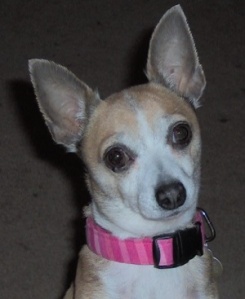
A common misconception about these chiseled, energetic dogs is that they are the tiny descendents of Doberman Pinschers. They are actually not related at all to their large counterparts. Min Pins were developed in Germany from Terrier breeds. Many experts also think that there was some crossing done with Italian Greyhounds. This breed is popular today as a household pet, but originally they were meant hunt rats and other vermin.
Many owners believe this breed is not for everyone. They can become aggressive with other dogs, but are good with well behaved children as long as authority are socialized early. In fact, a lot of their personality depends on how they that is raised as puppies. A large number of breeders also recommend that owners purchase an exercise pen.
Though they sometimes appear delicate, Miniature Pinschers are quite a healthy and hearty breed with few genetic disorders. Simple, minimal maintenance such as cleaning their teeth and trimming their nails will keep them healthy. In fact, their biggest health risk is a child that plays with them too roughly. They aren’t for everyone, but they will make a wonderful pet for anyone willing to love them as much as they deserve.
Mull Over the Chweenie As Your Next Pet
October 14, 2009
Mull over the Chweenie! The what, you say?! The Chweenie is a charming breed, melding all of the best characteristics of its ancestors, the Chihuahua and the Miniature Dachshund. wholesale dog breeders do not breed this odd combination intentionally; but natural desire sometimes insists and voila! The half of the moniker “weenie” derives from the nickname for Dachshunds: “weiner dogs” because of their elongated, slim, Oscar Mayer torsos. The look is so sweet you can barely keep from hugging them!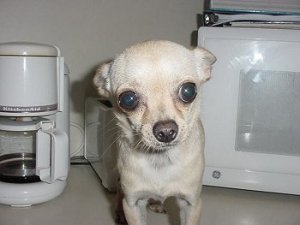
What characteristics of the two kinds blend in the chweenie? Is is thought that the Chihuahua was raised to contain the rodent population in Mexican cities, where the dogs used to wander in wholesale dog gangs to find prey. But they went on to become the dears of the rich and famous, particularly debutantes. Carried in purses and accompanying their best human friends to restaurants, wholesale dog stores, and everywhere else, the little dogs became a mark of success. As little as just two pounds, with pointy ears, silky or smooth coat, of brindle or tan, the Chihuahua is the embodiment of the babying that humans do to indulge dogs. Remember the pictures of Paula Abdul with her fascinating Chihuahua? These little darlings get dolled up; groomed; have ribbons put in their little topknots, and they nestle blissfully with their besotted owners!
The Dachshund is nearly the contrary. It was raised as a hunter. It is a true scent hound, following its prey mainly by sense of smell, although its hearing is very sharp as well. Its broad front, longish floppy ears (that can also perk up straight), squat limbs and elongated torso make it perfect for searching out animals that live underground and, in fact, it was originally a specialist in hunting badgers. The Dachshund is adamantly steadfast, but not particularly fond of humans other than its own. The miniature Dachshund has the characteristics of its more ordinary-sized counterparts, but packed in a bitty torso. Even as a miniature dog, it is not inclined to exhibit the wholesale dog human syncophancy that the Chihuahua works on.
Put them together and what have you got? A little mutt with ears that are either straight up or drooped down, broad chest, elongated torso, but often without the stumpy limbs of the Dachshund. The chweenie keeps some of the enthusiastic qualities of the Chihuahua, but hunting talent goes to its core and the chweenie more often than not will be enthused about the chance to hunt in his backyard. The cheweenie does not comprehend that it is pint-sized and won’t confine itself to prey its size, so don’t permit it to run free in the woods! Don’t count on gussying up your chweenie or transporting it around with you to the fancy wholesale dog food stores; they are too freedom-loving for the kind of fussing that Chihuahuas naturally attract.
The chweenie: really, really appealing but no-nonsense. If you buy one, you won’t have second thoughts.
Small Dog Breeds Suitable for Small Homes
October 10, 2009
If you have always wanted a dog but feel because you live in a smaller home or apartment it would not be fair to the animal you may wish to reconsider. There are a large number of toy and smaller breeds of dogs that are perfectly content and happy living in smaller places. Whether you choose a large or small dog they all need exercise and companionship. Dogs are very social animals and love to go on walks to see and smell different things. This keeps them happy and from getting bored. Many large dogs require a long walk or run for exercise but most of the little fellows are usually happy with a short walk to keep from becoming bored. Some other advantages to having a small dog are; they make great lap dogs, are easy to take places, if they share your bed you still have room to stretch out and they are less expensive to feed. Once you are committed to accepting the responsibility of owning a small dog, check out different breeds until you find one that best suites your lifestyle.
Cavalier King Charles Spaniels
The King Charles Spaniels are definitely a dog that loves affection and curling up in your lap. They are happy, friendly and great with children and other animals. These little fellows are very adaptable to a hectic or calm household. A weekly brushing will keep them looking great.
Chihuahua
The Chihuahua is a very tiny dog that usually does not weight over 6 or 7 pounds and are best suited to older children. There are two varieties of Chihuahua, which are long coats and smooth coats. Brushing them once a week will keep shedding to a minimum. These small dogs are extremely devoted and loyal to their master. An alert, happy and active dog, their average life expectancy is approximately thirteen years.
Toy Poodles
The toy poodle is another great choice for an apartment or small home. They are very intelligent, easy to train and adapt well into quiet or busy households. These lively, happy dogs love playing and being with their family. Poodles do not shed so they require brushing a few times weekly, bathing and trimming, every four to six weeks. Their average life span is eleven years.
Maltese
These adorable little dogs not only want but also need to spend time with their owners. They are only four to six pounds and usually white in color with beautiful dark eyes. These wonderful family dogs love being both inside and outside. They require daily walks or exercise and brushing a couple of times weekly. Their average life span is thirteen years.
Shih Tzu
These little dogs are fantastic family dogs that love people and playing but do require a moderate amount of exercise daily. Because of their long hair, daily brushing is required. The Shih Tzu’s average life span is thirteen years.
Learn as much as possible about the breed of dog you are interested in and talk to several breeders or people that own them. In addition, there are animal rescue organizations that are looking for homes for many small breeds of dogs. You can find a lot of information about this on the internet or locally.
Chihuahua – Choosing the Right Breed of Dog
October 8, 2009
Getting a dog can change your life. If you get a dog that is compatible with your lifestyle, it can be a very rewarding experience, but all dogs require love, attention, care and training, so before you make that decision, ask yourself these questions: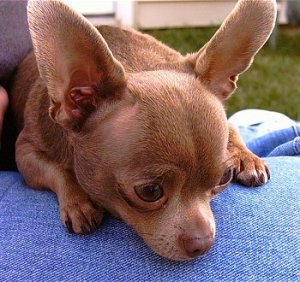
* Do I have time to give a dog the attention it requires?
* Do I have the ability to provide proper grooming, exercise and training for a dog?
* Can I afford the expenses that come with a dog?
* Do I have what it takes to be a strong pack leader?
* Do I want to buy a dog from a breeder or adopt a dog from a shelter or rescue?
If, after answering the above questions, you decide to move forward with getting a dog, it would be wise to learn about the different breeds and their characteristics, personality/temperament, possible health conditions and exercise and grooming requirements in order to make an informed decision.
This article is a basic overview of one particular breed — a Chihuahua. Read on to decide if this breed of dog is compatible with your particular lifestyle.
History/Background: The Chihuahua is said to be the oldest breed on the American continent and the smallest breed in the world. It is native to Mexico but likely came from the ancient Techichi dogs of the Toltec, crossed with hairless dogs of the Orient. It was named after the Mexican state of Chihuahua, from where it was brought to the rest of the world by travelers. This breed was used in religious ceremonies and is believed to have been sacred to the pre-Columbian Indian nations. It was brought to Europe at the end of the 19th century.
Physical Characteristics: The Chi, as it is sometimes called, is a tiny dog with an apple-shaped head and a short pointed muzzle. It has large, round, very dark eyes and large ears. Its body is stout, and it is longer than it is tall. The tail is curled over the back or to the side. There are two varieties — a short-haired type and a long-haired type. The various coat colors include fawn, sand, chestnut, silver and steel blue, black and tan and parti-colored. A Chihuahua weighs from 2 to 6 pounds and is 6 to 9 inches tall.
Personality/Temperament: The Chihuahua is a good companion dog with terrier-like qualities. Because of its small size, it makes a good traveler and usually loves outings. It craves attention, affection and petting and is intensely loyal, becoming very attached to its owners. It is a courageous, lively, proud and cocky little dog with a saucy expression. It moves swiftly to avoid being stepped on.
This breed may be slightly difficult to train but is intelligent, learns quickly and responds well to proper positive reinforcement training. It may require patience to housebreak. If the owner does not display strong pack leadership, this little dog can become strong willed and will develop other behavior issues such as jealousy and becoming suspicious of people other than its owner. This breed is not recommended for children as it is easily provoked to attack and may snap at them. If not walked daily, it may become yappy, protective, snappish and untrustworthy with children and people it does not know. The Chi should be socialized as a puppy to avoid excessive aggressiveness towards other dogs and being reserved with strangers.
Possible Health Conditions: The Chihuahua tends to wheeze and snore because of its short nose. Its prominent eyes are susceptible to corneal dryness and secondary glaucoma. It is also prone to slipped stifles (a knee injury caused by joint weakness), eye infections, gum problems, colds, stress, rheumatism, epilepsy, seizure disorder and low blood sugar. It tends to gain weight if overfed. It is vulnerable to fractures and other accidents as a puppy. This breed of dog is born with an unclosed section of skull which usually closes but can remain open throughout life and make it prone to injury. Life expectancy is about 15 or more years.
Exercise/Grooming: Although playing takes care of a lot of its exercise needs, the Chi requires a daily walk and also enjoys a good romp in an open area off leash such as a fenced-in yard.
The short-haired type should be gently brushed occasionally or wiped with a damp cloth. The long-haired type should be brushed daily with soft-bristle brush. Bathe both types only about once a month, taking care not to get water in the ears because of possibility of ear infections. The ears should be checked regularly and the nails kept trimmed. The Chihuahua is an average shedder.
Living Conditions: This little dog hates the cold and may shiver. It tolerates and even appreciates a warm sweater on cool days. It must be kept indoors and is a good dog for apartment life.
Summary: Chihuahuas make good companion dogs, travel well and require little grooming and exercise, but they may be a little difficult to housebreak and can become strong willed if not given proper pack leadership. So, now that you’ve learned a little about this breed of dog, one question remains — Is a Chihuahua the right breed for you?
The Coats and Colorations of Chihuahuas
October 8, 2009
While most people may think of Chihuahuas as having the distinctive fawn or cream colorings, these dogs actually come in an array of colors. If you are looking at the prospect of getting a Chihuahua puppy, you are in for quite a variety of color selections, which is a result of the interbreeding of coat colors in the parents.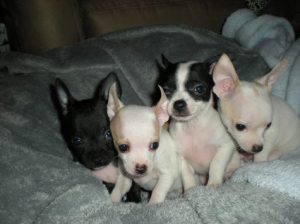
Various Colors:
Chihuahuas come in almost every color, you oftentimes see fawn, solid brown, solid white, solid black, cream, chocolate, blue, silver, sable or they can be tricolor or even have patches of several different colors. Bridles Chihuahuas are a mix of two or three color combinations.
Quality of the Coat:
The two coat qualities a Chihuahua might have are smooth and long haired. The more common Chihuahua coat is the smooth coat, which is short, glossy and evenly textured over the body. They have a furry tail, which is the preferred standard of the breed. The feet of a Chihuahua should also have feathering and there should be a tuft of fur around the neck. The hair on the head and ears should be sparse or scanty.
A Long Haired Chihuahua may have either curly or smooth hair. The hair is slightly longer and has an undercoating beneath.
The Role of Genetics:
It is always important to have an idea about the genetics of a breeding Chihuahuas. You should become familiar with bloodlines of both the male and female.
Genotype (Genetic Traits You Cannot See):
You should also note that the smooth coating of a Chihuahua is a result of a dominant gene or genotype. The long hair coat results because of a recessive gene.
Phenotypes (Genetic Traits You Can See):
A Phenotype is actually something you can see on the dog, but that does not negate the fact that a genotype at a molecular level (unseen), may actually harbor either a recessive or dominant gene. Thus when time for breeding, if you are simply seeking a phenotype characteristic, you may be surprised if you breed together two smooth coated (dominant gene) Chihuahuas and they produce a long hair puppy.
A puppy with a smooth coat (phenotype, which can be seen) is said to have a heterozygous genotype and both the male and female contribute a dominant gene.
If one of the parents has a dominant gene, while the other has a recessive gene, yet the puppy still has a smooth coat, the puppy has a heterozygous genotype in its bloodline.
If two smooth coated parents have a heterozygous genotype, this means they both carry dominant and recessive genes in their bloodlines. In cases like this, the puppies may be born with either long haired or smooth coats.
Some breeders have concerns about the interbreeding of long haired and smooth coated dogs. They fear that the dominant smooth coat may soon disappear. However, as was explained previously, heterozygous genotypes may still result in smooth coats. Other breeders believe this is a fear that is unfounded right now.
Grooming a Chihuahua:
Grooming your Chihuahua requires minimal effort. You only need to do a bi-weekly brushing of a long haired Chihuahua using a soft bristled brush. The long haired Chihuahua bib (or front of the chest), tends to become dirty and matted if not properly cared for. The anal area underneath the tail might become matted with feces and you will need to keep it clean by bathing the dog or clipping off the hair, which alleviates the problem completely.
You will need to brush a smooth coated Chihuahua weekly.
Bathe your Chihuahua at least once a month and be mindful not to get any water or shampoo into the ears, these little dogs are fragile and subject to inner ear infections.
With minimal effort you can keep your Chihuahua happy, clean and well groomed.
Recognizing An Honest Chihuahua Breeder
October 8, 2009
One of the most popular small breed dogs in the world is the Chihuahua. Ever since the sweet, little face of one of these adorable dogs graced our televisions to ask us if we wanted some tacos, the world has gone crazy with people looking for the perfect little pup. Unfortunately, this has created a wide open market for the dishonest Chihuahua breeder who is looking to make a quick dollar. These unscrupulous breeders are churning out pups by the dozen in breeding centers known as puppy mills.
The sad thing is, most people do not realize that when they purchase a Chihuahua puppy from a pet store, they are contributing to the inhumane conditions in which these puppy mills keep their dogs. Because, unbeknownst to buyers who only see the sweet little faces in the window, the majority of pet stores are being supplied directly by many a dishonest Chihuahua breeder. Even store owners which claim they only buy from respected breeders are playing into this fallacy.
The puppy mills that supply pet stores around the country breed their dogs in horrible conditions. Often a Chihuahua breeder that runs one of these mills will breed the same female every single time she comes into season. This is dangerous because a Chihuahua is so small to begin with, that each pregnancy deteriorates their body quite a bit. By not allowing a season or two to pass in between litters, you wind up with very sick females – and consequently, sick puppies.
Worse yet is the fact that a dishonest Chihuahua breeder will not take each litter of pups to a quality vet to receive the proper medical attention that small breed puppies need. By the time the pups reach the pet store they can be quite sick and often dying. Many an unsuspecting would-be owner has found himself or herself with a brand new puppy that costs them thousands of dollars in veterinarian bills, only to die shortly thereafter.
You can do your part in the battle against the dishonest Chihuahua breeder by simply refusing to purchase any pup from a pet store. The conditions in which pet store animals are forced to live aren’t much better than those in the puppy mills. This has led to many new dog owners discovering that their new puppy needs extensive medical attention, or worse needs to be put down immediately. All too often, the pups bought in pet stores die within just a few months of going home with their new owners.
The most important thing to remember is that an honest Chihuahua breeder will never sell a single puppy to any pet store. Respectable breeders will make certain that their pups receive the medical attention they need to ensure they are healthy, and will never breed a female before she has completely healed from her last litter. Join the fight against puppy mills by talking to your vet, and asking for a recommendation for a respectable Chihuahua breeder today!
Get Ready For Your New Chihuahua Puppy
October 8, 2009
For your Chihuahua puppy’s safety, you need to not only puppy-proof your home and have a regular and emergency vet’s number by the phone, but you need to make sure your Chihuahua puppy’s name is sensible. Your pup will get into a lot of mischief – some of it potentially lethal. Your Chihuahua puppy will need to learn to pay attention to you and look to you for guidance. You can’t do that if you don’t give the pup a name that he or she ignores.
Chihuahua puppy names should make them look at you. They should be two syllables or less. They should sound different from any of the commands the puppy needs to learn for training. Even “Puppy” is a better name than “Senior Taco Bell Loco” or “Sit.” You never should physically reprimand your Chihuahua puppy because one blow could kill them. You need to voice train them, which is only possible if they recognize their name.
Chihuahua puppies do not mix well with other dogs, since they can be easily killed by one bite. They need constant supervision, such as any other newborn. They need to be protected from extremes in temperature because of their small size. It is best that they live inside the home with you all the time. Chihuahua puppies (especially the short haired kind) shiver often and very easily. This is not always because they are cold, but also when they are agitated or nervous.
You need to keep a close eye on your Chihuahua puppy’s health. Since they are so small, they dehydrate very quickly and can die from it. Any vomiting more than twice a day and any diarrhea needs to be dealt with immediately. Don’t give them lots of table scraps or milk as this can give them diarrhea. They need good quality dry and wet dog food. Dog food is actually more nutritious than the stuff you are eating.
If you bought your Chihuahua puppy from a breeder, you probably noticed the slow, shuffling walk they use, never picking their feet off of the floor. This is to prevent any accidental stepping on the Chihuahua puppies. For this reason, you should never get a Chihuahua puppy if you have a young, active child. Also, load your laundry one piece of clothing at a time to be sure the puppy did not mistake the laundry basket for a bed.
Chihuahua puppies are actually stronger than some other slim breeds of dogs, namely the Italian Greyhound. They are also one of the most intelligent breeds of dog and learn about house safety in a matter of weeks (as opposed to years in a human child). Teach your puppy his or her name as soon as possible. Keep any Chihuahua puppy names short, in case you have to call them away from any potential danger.
Methods You Can Use to Find a Chihuahua Rescue Group
October 8, 2009
It is a cold and cruel person that would abandon or abuse a little Chihuahua dog and if you know of a situation where a little Chihuahua dog is being abused or has been abandoned then you can do the right thing and contact a Chihuahua rescue group right away. There are resources all around that can help you find a rescue group and it is the right thing to do rather than let the little dog suffer.
One of the best resources for any humane group contact information is your vet. Your vet is very concerned about the health and well being of all animals and does not want to see a little dog suffer any more than you do, so they would gladly give you any contact information they may have. If you do not use a vet then just contact one from the phone book and they would be able to help.
For some reason people always forget that the local newspaper is a collection area for a lot of important community contact information and they may just have Chihuahua rescue group contact information for you. Many local newspapers publish the animal rescue groups contact information on a regular basis or at least have it available to distribute should someone call looking for help. So it never hurts to call your local newspaper and see what they have in the way of contact information for local animal rescue groups.
Never forget about the Internet, as it is a great way for people all over the world to get the information they need. With an Internet search you may find contact information for local animal rescue groups or you may find the websites of national animal rescue groups. Check the national groups to see if they list any satellite offices near you and if they do not then give them a call and see what advice or assistance they can offer you.
Check your area for any reputable Chihuahua breeders and chances are that they can act as a Chihuahua rescue group for you. Many reputable breeders have no problem taking in abused or abandoned pets, as the breeder does not want to see an animal suffer any more than you do. So contact a breeder and explain your situation to them and ask them if they would be able to take in this poor neglected little animal and give it a second chance at life.
Never turn your back on an abandoned or abused Chihuahua or any other animal that is suffering. In many cases all you have to do is make a phone call and an animal rescue group will come out and take care of the rest. Every animal deserves the chance to be happy and no pet deserves the horror of being abused or abandoned so if you see a situation that requires immediate attention then track down contact information for a local animal rescue group and give a little pet a second chance.